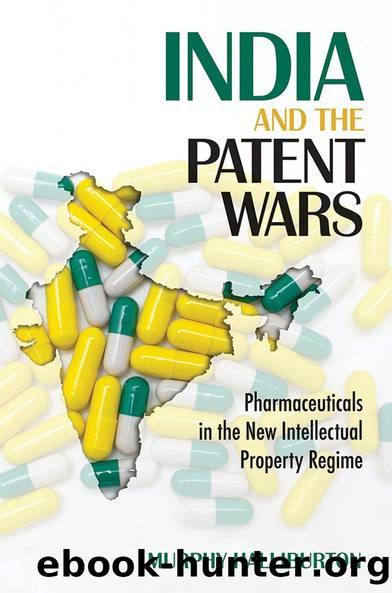India and the Patent Wars by Murphy Halliburton

Author:Murphy Halliburton [Halliburton, Murphy]
Language: eng
Format: epub
Tags: Social Science, Anthropology, Cultural & Social, History, Asia, India & South Asia, Business & Economics, Industries, Pharmaceutical & Biotechnology
ISBN: 9781501713989
Google: qs46DwAAQBAJ
Publisher: Cornell University Press
Published: 2017-11-15T04:27:48+00:00
Pursuing the Big Pharma Perspective
Because of the difficulty I encountered in attempting to meet with employees of pharmaceutical companies, I decided to follow Hugh Gustersonâs (1997) suggestions for âpolymorphous engagementâ around the periphery of powerful, inaccessible institutions. This is an approach Gusterson developed in his ethnographic study of nuclear weapons scientists whose work was secret and whose laboratories he could not visit. He had to operate around these restrictions, meeting scientists in community settings and through other indirect engagements such as visiting the churches they attended and using media sources to supplement his work. My methods of attempting to get the pharmaceutical companiesâ perspectives on patent controversies involved tracking corporate actions in the media, doing content analysis of their self-presentations on the Internet, visiting their corporate offices to see what I could glean from the publically accessible areas, and speaking to representatives of companiesâ international access programs. I had decided, as a polymorphous engagement strategy, not to directly ask, say, a company lawyer about his or her position on patents, as I anticipated it would be hard to get access to such individuals and the topic might be too sensitive to speak about in any form other than a well-vetted press release. Instead, I choose to contact people in corporate philanthropic or social responsibility programs and ask how they balance their defense of patent rights and issues of access to essential medicines for the underserved, a problem I figured they must have reflected on. I also spoke to representatives of pharmaceutical companies in India that had direct business relations with United Statesâbased companies.
The difficulty of deciphering the new patent system for ayurvedic practitioners stems from the unpredictable effects of the coming together of patent law, ayurvedic medicine, and the global political economy. For those concerned about access to biomedical products, the difficulty in assessing the new system stems partly from pharmaceutical companiesâ desire not to be studied and to control the message they give to the public.
The medical anthropologists Whyte, Van der Geest, and Hardon (2002) discuss Maarten Bodeâs research on the ayurvedic and unani pharmaceutical industries in India and remark on the apparent ease with which Bode was able to meet manufacturers. They conclude: âProbably the Indian [ayurvedic] companies hoped to gain recognition by allowing a researcher on their premises.â They then add that âfor the same reason [concern about their reputation] âWesternâ producers of pharmaceuticals have done the opposite and closed their doors to social scientists. They haveâto the best of our knowledgeânever allowed anthropologists to study their companiesâ (136).
Having worked with both ayurvedic and biomedical producers, I concur in this observation, although I was able to make inroads into directly studying biomedical pharmaceutical companies. Since Whyte, Van der Geest, and Hardon made this point in 2002, direct contact with pharmaceutical companies by social scientists is still rare. There is burgeoning interest in the social analysis of the use of pharmaceuticals. Such research, which has been conducted in various parts of the world, including North America, West Africa,
Download
This site does not store any files on its server. We only index and link to content provided by other sites. Please contact the content providers to delete copyright contents if any and email us, we'll remove relevant links or contents immediately.
Life 3.0: Being Human in the Age of Artificial Intelligence by Tegmark Max(5558)
The Sports Rules Book by Human Kinetics(4386)
The Age of Surveillance Capitalism by Shoshana Zuboff(4292)
ACT Math For Dummies by Zegarelli Mark(4049)
Unlabel: Selling You Without Selling Out by Marc Ecko(3663)
Blood, Sweat, and Pixels by Jason Schreier(3624)
Hidden Persuasion: 33 psychological influence techniques in advertising by Marc Andrews & Matthijs van Leeuwen & Rick van Baaren(3565)
The Pixar Touch by David A. Price(3439)
Bad Pharma by Ben Goldacre(3428)
Urban Outlaw by Magnus Walker(3395)
Project Animal Farm: An Accidental Journey into the Secret World of Farming and the Truth About Our Food by Sonia Faruqi(3221)
Kitchen confidential by Anthony Bourdain(3090)
Brotopia by Emily Chang(3055)
Slugfest by Reed Tucker(3004)
The Content Trap by Bharat Anand(2926)
The Airbnb Story by Leigh Gallagher(2856)
Coffee for One by KJ Fallon(2636)
Smuggler's Cove: Exotic Cocktails, Rum, and the Cult of Tiki by Martin Cate & Rebecca Cate(2540)
Beer is proof God loves us by Charles W. Bamforth(2461)
